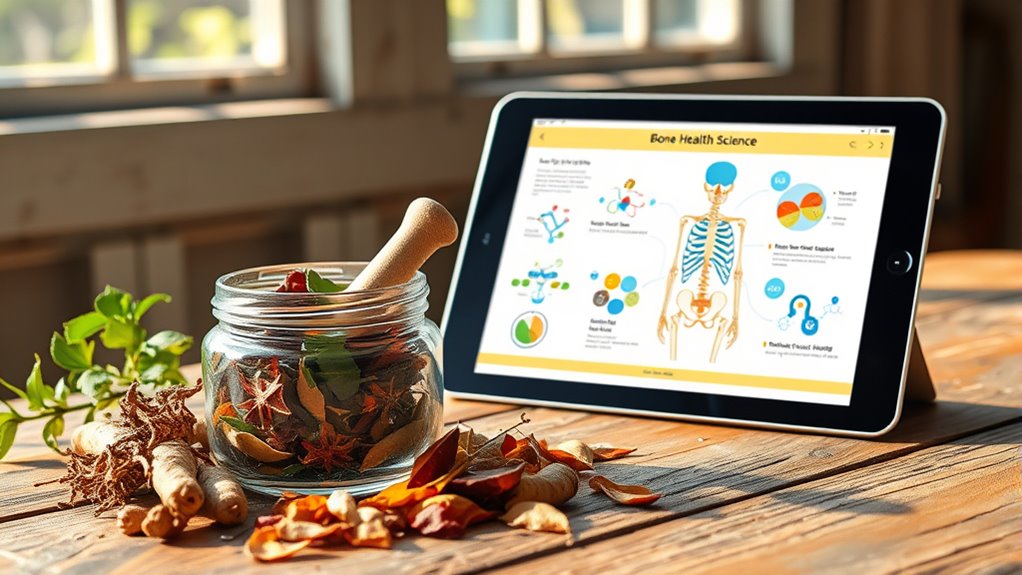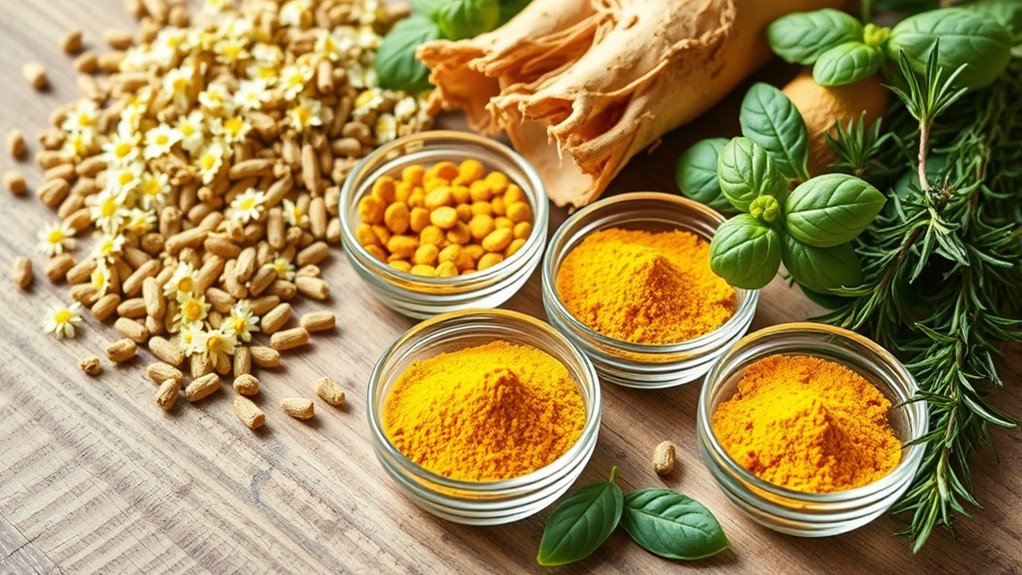Herbal supplements may support your bone health by providing nutrients like silica and calcium or reducing inflammation, but scientific proof of their effectiveness remains limited. While some herbs like horsetail and turmeric show promise, most evidence comes from small studies or animal tests. They shouldn’t replace conventional treatments but can complement a balanced diet and exercise. To understand how to safely incorporate herbal remedies into your routine, explore more about what’s known and what to watch out for.
Key Takeaways
- Some herbs like horsetail and alfalfa contain minerals beneficial for bone formation, but scientific evidence of their effectiveness is limited.
- Research on herbal supplements for bone health is inconclusive, often based on small studies or animal models.
- Herbal interactions and safety concerns require consulting healthcare providers before use, especially with medications.
- Herbal supplements should complement, not replace, conventional treatments and a balanced diet for optimal bone health.
- Quality control varies among brands; choosing reputable products and professional guidance ensures safe, effective use.

Maintaining strong bones is essential for overall health, and herbal supplements can be a natural way to support this goal. Many people turn to alternative medicine to boost bone density and prevent conditions like osteoporosis. Herbal supplements often contain compounds believed to promote calcium absorption, stimulate bone growth, or reduce inflammation that damages bone tissue. While these approaches are appealing, it’s important to understand what science says about their effectiveness.
Herbal medicine has a long history of use, but scientific evidence on its impact on bone health varies. Some herbs, such as horsetail and alfalfa, are rich in minerals like silica and calcium that are crucial for bone formation. Others, like turmeric and ginger, have anti-inflammatory properties that might help reduce bone loss caused by chronic inflammation. However, the effectiveness of these herbs depends on factors like dosage, preparation, and individual health conditions. Research is ongoing, and while some studies show promising results, they often involve small sample sizes or animal models, making it hard to draw definitive conclusions.
Herbal effects on bones vary; research is ongoing with limited conclusive evidence.
One concern with herbal supplements is herbal interactions. Since many herbs can interact with medications or other supplements, you need to be cautious. For example, herbs with blood-thinning properties, like ginseng or garlic, could increase bleeding risk if combined with anticoagulants. Similarly, herbs that influence hormone levels, such as red clover or black cohosh, might interfere with hormone therapies or affect bone health differently depending on your age and health status. These interactions highlight the importance of consulting a healthcare provider before adding herbal supplements to your routine, especially if you’re already on medication or have underlying health issues.
While alternative medicine offers a natural approach to supporting bone health, it shouldn’t replace conventional treatments prescribed by your doctor, especially in cases of diagnosed osteoporosis. Instead, herbal supplements should complement a balanced diet rich in calcium and vitamin D, regular weight-bearing exercise, and other lifestyle choices that promote bone strength. Remember, not all herbal products are created equal; quality, purity, and dosage vary widely among brands. Look for reputable sources and consider discussing your supplement plan with a healthcare professional to avoid potential herbal interactions and ensure safety.
Frequently Asked Questions
Are Herbal Supplements Safe for Long-Term Use?
You might wonder if herbal supplement safety maintains its integrity for long-term herbal use. While many herbal remedies are natural, long-term use can pose risks like interactions with medications or unknown side effects. It’s essential to consult your healthcare provider before starting or continuing herbal supplements for an extended period. Monitoring your health and sticking to recommended doses helps ensure safe long-term herbal use and minimizes potential risks.
Can Herbal Supplements Replace Calcium and Vitamin D?
They say, “Don’t put all your eggs in one basket,” and that applies here. Herbal supplements can’t fully replace calcium and vitamin D because their herbal potency varies, making them less reliable. Natural alternatives can support bone health, but they shouldn’t be your sole source of these essential nutrients. Relying solely on herbal supplements risks deficiencies; instead, combine them with balanced diets and medical advice for best results.
Do Herbal Supplements Interact With Osteoporosis Medications?
You should be aware that herbal supplement interactions can affect your osteoporosis medication. Some herbs may interfere with medication absorption or effectiveness, reducing their benefits. Others could cause unwanted side effects or diminish medication synergy. Always talk to your healthcare provider before adding herbal supplements to your routine, especially if you’re on osteoporosis meds. They can help guarantee safe use and best treatment outcomes.
Which Herbal Supplements Are Most Effective for Bone Health?
You seek the most effective herbal supplements for bone health, focusing on herbal supplement quality and dosage. Look for supplements with high-quality ingredients, standardized extracts, and proper labeling. Prioritize herbal supplements like horsetail, alfalfa, and black cohosh, known for supporting bone strength. Make sure you follow recommended herbal supplement dosage to maximize benefits and minimize risks. Always consult your healthcare provider before starting new herbal regimens for ideal results.
Are Herbal Supplements Suitable for Children or Pregnant Women?
You should be cautious about giving herbal supplements to children or pregnant women, as herbal safety isn’t always guaranteed. These groups have sensitive health needs, and some herbs can cause adverse effects or interact with medications. It’s best to consult a healthcare professional before use. Protect your children’s health and guarantee safety by choosing options that are proven safe and appropriate during pregnancy.
Conclusion
While herbal supplements may seem like a natural way to support your bones, scientific evidence remains limited. Some herbs, like horsetail or turmeric, show promise, but their effects aren’t yet proven to prevent fractures or markedly boost bone density. It’s essential to approach these supplements with caution and consult with healthcare professionals. Relying solely on herbal remedies might overlook proven strategies like proper nutrition and weight-bearing exercise, which are backed by solid research for maintaining strong bones.










